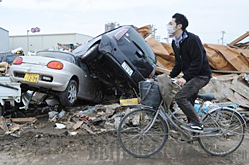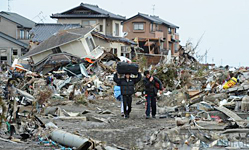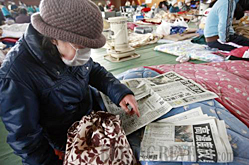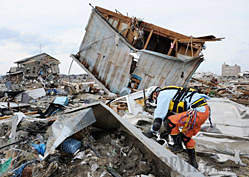|
 |
 |
|
POST-QUAKE WOES: A man cycles past cars tossed about by the earthquake and tsunami in Natori, Miyagi Prefecture, on March 14 (XINHUA/AFP) |
RETRIEVING BELONGINGS: Residents carry items recovered from the disaster in Natori, Miyagi Prefecture, on March 14 (XINHUA/AFP) |
"Popularization of the BCM made a great difference in the latest earthquake," said Masahiro Kaishi, General Manager of InterRisk Consulting (Shanghai) Co. Ltd.
He said the BCM can answer questions like what an organization should do after an earthquake, what is the priority when an earthquake happens, and what kind of supplies should be prepared beforehand.
"We cannot predict or resist natural disasters. But it is possible for us to discuss how to implement post-disaster reconstruction and make workable plans," he said.
Economic resilience
The earthquake, tsunami and ongoing radiation leaks have caused huge economic losses in Japan. The most pessimistic estimate has been that the disaster could cost up to 20 percent of Japan's total GDP. In addition, foreign investors are worried about radiation leaks.
But observers believe although the Japanese economy has temporarily capsized, it will not sink.
"People should not underestimate Japan's economic strength and its self-healing ability," said Feng of the CASS. He predicted the country's GDP growth would decline in the next six months, due to damage to businesses and transportation infrastructure. However, by 2012 or 2013, Japan's GDP growth will accelerate with reconstruction.
"Japan is a mature economy, and its GDP growth rate was pretty high among developed countries before the earthquake," said Feng. "It is impractical to expect Japan's GDP to have a rocketing growth rate, as in the 1950s and 1960s, after the earthquake. But the country can revitalize its economy."
He noted post-earthquake reconstruction would provide opportunities for many domestic enterprises. Plus, the country's unemployment rate will greatly decrease. Some Japanese enterprises have resumed production in the immediate aftermath of the disaster.
Sun Lijian, Deputy Dean of the School of Economics at the Shanghai-based Fudan University, said Japan's economy would not sink, due to the country's solid economic foundation.
Although economic losses are huge, its impact on Japan's processing industry and exporters would not exceed the negative impact of the 1995 Kobe earthquake, he said. Japan's processing industry and export-oriented enterprises are now mainly concentrated in the Tokyo-Yokohama industrial zone, Kobe and Kyushu. Although Japan has tried to accelerate the pace of industrial modernization in the northeast, the earthquake-hit region's economic contribution to the country was still not as large as many other regions.
It took Japan only six months to rebuild Kobe's production capacity after the earthquake in 1995, and two years for the country's economy to recover, which was much better than expected, Sun said. He pointed out the country's domestic economic risks are reduced, since Japanese companies are highly internationalized. If the nuclear pollution stopped deteriorating, it wouldn't take too much time for Japan to recover, he said.
 |
 |
|
REMAINING CALM: A woman reads reports about radiation leaks at the Fukushima nuclear power plant at a temporary shelter in Ofunato, Iwate Prefecture, on March 16 (EN ZHENGLAI) |
LOOKING FOR LIFE: A rescuer searches for survivors amidst earthquake and tsunami wreckage in Natori, Miyagi Prefecture, on March 14 (XINHUA/AFP) |
He said, however, that damage to production lines and the country's power supply systems may slow down recovery. In addition, to increase liquidity, Japan's central bank injected 40 trillion yen ($495 billion) into the country's financial institutions. Sun worried that the capital inflow would increase the burden on the debt-ridden government. Moreover, commodity shortages and high liquidity might lead to high inflation, which is common after disasters.
Reconstruction, nevertheless, will provide opportunities for Japanese investors and help relieve the country's unemployment problem in the long term. The decreasing unemployment rate and increasing profits of domestic enterprises would help the Japanese Government to reduce its deficit, Sun said.
Besides foreign assistance to the disaster-hit area, the Group of Seven major industrialized countries, including Japan, have jointly intervened in the foreign exchange market to prevent the appreciation of the yen.
If the Japanese economy collapses at this crucial moment of global economic recovery, the effect will be disastrous. Since the yen is an important global currency, efforts to stabilize its exchange rate will help not only Japan but also the entire global financial system.
New priorities
"The disaster will not completely dash Japan's economic potential. But it will hopefully propel the country's conservative political and economic systems to change," said CASS' Feng.
During the past few years, Japanese politicians have paid too much of their attention on elections. They have made a "patriotic show" of territorial issues to win more votes instead of doing practical things for their country, he said.
Although Japan's disaster preparedness system worked well after the earthquake, people felt different parties were unable to unite, he said, referring to the Liberal Democratic Party's refusal of the ruling Democratic Party of Japan's (DPJ's) invitation to form a coalition government.
Before the earthquake, the approval rating for Prime Minister Naoto Kan's cabinet was low. Observers even predicted the Kan cabinet wouldn't last long. "The DPJ lacks administrative experience, but the Kan cabinet showed a sincere attitude after the disaster struck," said Feng. "The earthquake actually gave the Kan cabinet an opportunity. Kan should seize this chance."
Feng said the priority of the Japanese Government for now is resolving problems at the Fukushima nuclear plant. In addition, the whole process of dealing with radiation leaks has not been transparent enough, and the Japanese Government should provide more information to the international community.
Feng said that even though the Japanese economic situation seems hopeful, the Kan cabinet needs to pay more attention to economic problems.
Derek Scissors, a fellow with the Asian Studies Center of the Washington, D.C.-based Heritage Foundation, said Japan had serious economic problems before. "Debt-funded Japanese Government spending will be diverted to reconstruction, but the debt, an aging population and ineffective policy remain very difficult challenges," he said.
The disaster would create opportunities for firms that compete directly with Japanese firms and firms that can help with reconstruction, he added.
(With reporting by Chen Wen in New York) | 